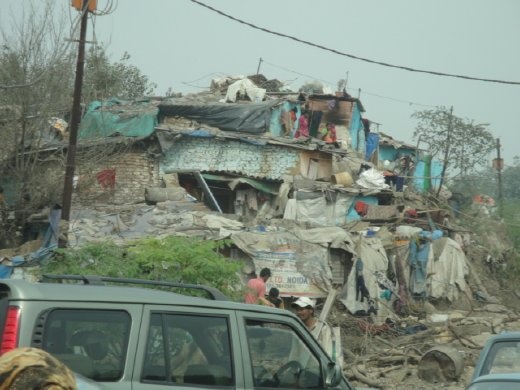We’ve been back from India for a month now—and I’m finding that it is still hard to put my thoughts together about the poverty we witnessed. The scale of poverty in India is staggering—it is in evidence everywhere: enormous numbers of people scratching out a meager living selling vegetables or small items by the side of the road; day laborers toiling on construction sites with rickety bamboo scaffolding and women, especially, carrying heavy loads of dirt on their heads while dressed in colorful saris and minding small children playing in the construction pits; adults with physical deformities sleeping in gutters; children, begging in traffic because their parents can’t afford the uniforms required for school; makeshift housing by the side of the road, seemingly assembled from bricks and scraps and sticks and tin and random bits of wood. Every once in a while these illegal encampments are bulldozed by the government, only to crop up again because there are no other alternatives for people to live. And in the midst of this hodge-podge housing, without running water or sewer systems—we see satellite dishes perched precariously atop decrepit-looking roofs—the ubiquitous TV, umbilical to the world, even here.



It’s hard to know how to take this in. Most of us know in an intellectual way that there is a lot of poverty in India, but I didn’t know that 94% of the population works in the “informal sector” or that only 3% of the entire population of almost 1.3 billion people makes enough money to pay taxes. We have this image of India as a country filled with call centers and outsourced American jobs—and yes, that exists too—but it is dwarfed by the sheer magnitude of people who are very, very poor.
And yet, amidst all this poverty, I did not find India depressing in the least. There is a palpable sense of energy about the place—as if everyone acknowledges that though economic deprivation defines the physical status of many, many people, is does not define their state of mind. I was deeply moved by the women and men we met who were working in their communities to build the skills and capacity of everyday people to help themselves. These are not outside “aid workers” brought in to “lift people up”—these are regular Indians deeply engaged in the common project of building their communities from the bottom up. Whether they are engineering solar cookers or designing embroidery patterns or saving 4 rupees a day in their own bank accounts, they are building their future at a relentless pace, which one day will overcome the slow press of poverty—and the energy they generate in the process will power the world.

Allison